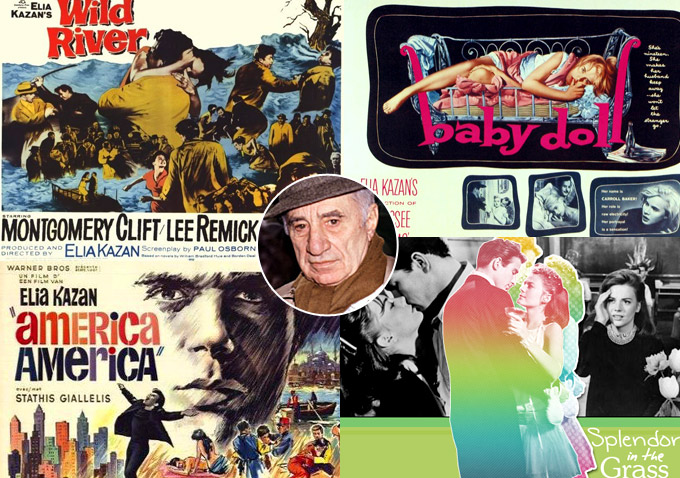 Elia Kazan famously once said, “The writer, when he is also an artist, is someone who admits what others don’t dare reveal.” And one could easily argue Kazan’s raison d’être was to go to emotional and psychological places few men dared to tread. While Kazan’s films were often marked by social issues to the outsider, the filmmaker was much more drawn to the pathos of the human condition, the painfully vulnerable, complicated and emotional naked places of the human psyche. And he loved and nurtured the vanity-free actors who were willing and able to facilitate such ends and emotional complex truths. Marlon Brando, the ne plus ultra of tough but overly sensitive and vulnerable American male, was Kazan’s muse, and the filmmaker loved how he could arouse, cajole and release extraordinary feelings in the actor.
Elia Kazan famously once said, “The writer, when he is also an artist, is someone who admits what others don’t dare reveal.” And one could easily argue Kazan’s raison d’être was to go to emotional and psychological places few men dared to tread. While Kazan’s films were often marked by social issues to the outsider, the filmmaker was much more drawn to the pathos of the human condition, the painfully vulnerable, complicated and emotional naked places of the human psyche. And he loved and nurtured the vanity-free actors who were willing and able to facilitate such ends and emotional complex truths. Marlon Brando, the ne plus ultra of tough but overly sensitive and vulnerable American male, was Kazan’s muse, and the filmmaker loved how he could arouse, cajole and release extraordinary feelings in the actor.
“He was an arch-manipulator of actors’ [emotions],” Brando once said of Gadg (Kazan’s nickname), ”And he was extraordinarily talented; perhaps we will never see his like again.” Through the Actors Studio and the Method he and Lee Strasberg championed, Kazan would dig deep in some fragile and fraught muck, using whatever means necessary to get a good and truthful performance, and by doing so took cinema into some exciting and even scary territories. He was a conductor and conduit for the performer, or as Robert De Niro once said, a “master of a new kind of psychological and behavioral faith in acting.”
The emotional fabric and texture in the films of Elia Kazan was always intense, raw, painfully naked, unsettling, ugly, and almost always tragic. Failure, shame, regret, disgrace, indignity (often within the family setting; those who know your deepest darkest secrets and fears) and self-aware tortured souls were his stock and trade. Whether it was the anguished cries of Marlon Brando unabashedly sobbing, “Stella!” in “A Streetcar Named Desire,” James Dean’s bad son Caleb desperately trying to attain the love of his disapproving father to no avail in “East of Eden,” or Brando again in the brutally honest “On The Waterfront” scene of emerging morality as the younger brother, Terry Malloy, confronts his elder brother about being forced to sell himself out all his life in the name of a dishonorable buck. These painful human intersections were where Kazan was most masterful.
Unquestionably one of the great American directors of the 20th century, Kazan has many unassailable classics to his name, including “East Of Eden,” “A Streetcar Named Desire,” “A Face In The Crowd,” the slightly less-watched but well-regarded “Gentleman’s Agreement” (eight Oscar nominations including a Best Picture win), and “On The Waterfront,” which receives a beautiful Criterion Collection upgrade this week on DVD/Blu-ray (which we discussed yesterday).
Kazan was nominated for Best Director five times and won twice for “Gentleman’s Agreement” and “On The Waterfront.” All in all he was nominated seven times by the Academy, and in 1999 was bestowed an Honorary Lifetime Achievement Award by the institution. Collectively, his 16 feature-length films were nominated 55 times, winning 20 times in total (including Best Picture wins for the same two movies he won the directing prize for). A self-avowed outsider, and son of Greek immigrants, Kazan was respected and revered, and yet saw his legacy forever tarnished because of his House Committee on Un-American Activities (HUAC) testimonies (no piece on Kazan is complete without at least some mention of the HUAC). But the art is ultimately what matters.
Clearly you’re familiar with his well-known classic films (or should be), and so reading about them is perhaps not overly revelatory. Kazan’s canon possesses a great and expansive body of work that encompasses four decades of cinema. With “On The Waterfront” hitting DVD/Blu-ray this week, we thought we’d use the occasion to dig a little deeper into the Kazan oeuvre with five, slightly lesser-known films you may not have seen.
 “A Tree Grows In Brooklyn” (1945)
“A Tree Grows In Brooklyn” (1945)
Based on Betty Smith’s novel, Kazan’s debut feature-length film is a heartbreaking yet beautiful coming-of-age tale chronicling a bright and precocious young girl who strives for a better life despite her family’s poverty, caused in part by her father’s alcoholism. Set in non-hipstery Williamsburg, Brooklyn in the early 20th century, the drama focuses on the Irish-American Nolan family and their difficult tenement existence; the hardworking housewife (Dorothy McGuire), the drunken father unable to care for his family (James Dunn, who won an Oscar for his supporting performance), the free-spirited Aunt Sissy (Joan Blondell) and of course, 13-year-old Francie (Peggy Ann Garner). Garner is a wonderful revelation as the clear-eyed pragmatist who still tries to believe in her father, but is invariably disappointed. Deeply moving, heartfelt and wistful, Kazan was dissatisfied with the film, due in part to its Hollywood sets, which he felt robbed the picture of an authenticity he was seeking. But the sensitive innocence lost (and optimistically regained) tale is classic Hollywood, and definitely worth tracking down. [B+]






Snitch.
I'm reading his autobiography right now. He literally just talks about sex the entire time. It's kind of disappointing.